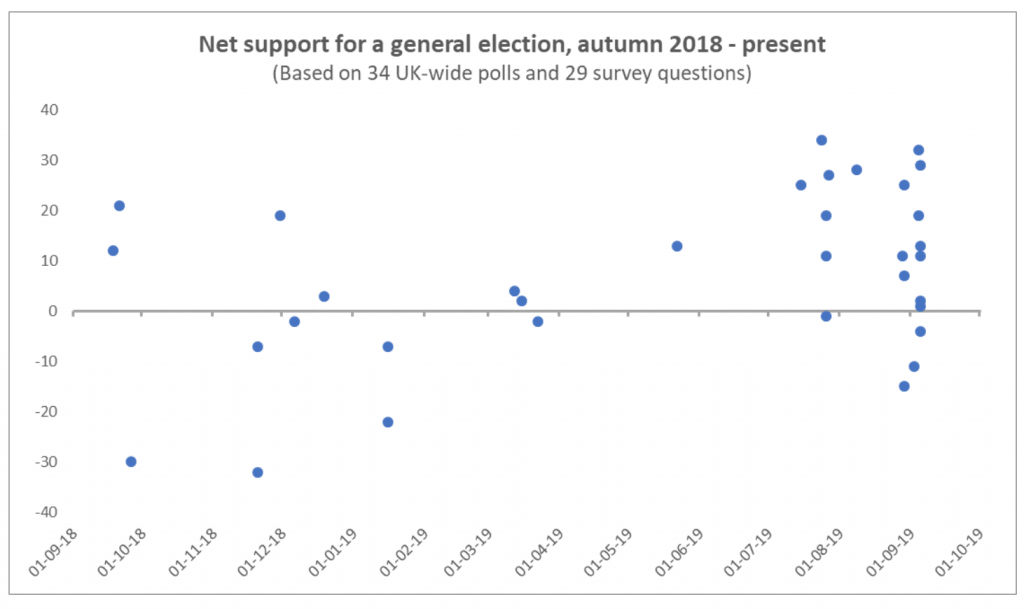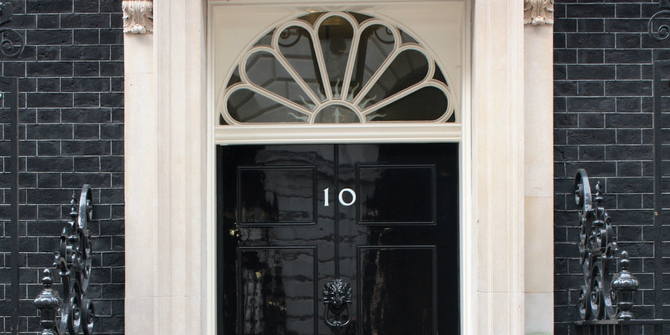 It is generally believed that voters are experiencing election fatigue, wanting politicians to sort things out rather than having to go to the polls again. However, data suggests the public actually support an early election. Lawrence McKay argues that this error is driven by lingering pre-Brexit concerns over public ‘apathy’ and by journalists’ anxieties about living in the Westminster ‘bubble’.
It is generally believed that voters are experiencing election fatigue, wanting politicians to sort things out rather than having to go to the polls again. However, data suggests the public actually support an early election. Lawrence McKay argues that this error is driven by lingering pre-Brexit concerns over public ‘apathy’ and by journalists’ anxieties about living in the Westminster ‘bubble’.
Those able to make out the Prime Minister’s Downing Street address on 2 September would have heard an unusual message. Politicians generally seek to puff out their chests for the cameras: no-one wants to expose themselves to – in that deathless political cliché – the charge of being ‘frit’. Yet Boris Johnson used that moment of maximum attention to tell the British people that ‘I don’t want, and you don’t want’ an election. Why? Commentators framed the line as a savvy attempt to get on the right side of ‘Brenda from Bristol’, whose vox pop in 2017 – ‘Not another one!’ – was one of that election’s most viral moments. But are we really a nation of Brendas? The evidence suggests otherwise.
What the data says
Across a swathe of polling data – much of it new, but some of it dating back to 2018 – the public has been moderately favourable to the prospect of a general election. It is difficult to know precisely: surveys are differently worded, present different scenarios, sometimes offer one-sided arguments and so on. For this reason, the range of results is wide: at one extreme, there might be 2:1 support for a general election, but different questions find the public is opposed overall. It is challenging to make sense of this, so I take two different approaches, each of which tell a similar story.
The first approach is to look at an average of all polls. If some scenarios, arguments, and wordings inflate support for an election but others depress it, then averaging can get us closer to the true level of support. Over 34 different data-points [and 29 survey questions] since late last year, the median support for an election has been 42%, and opposition slightly lower at 35%. The figure below shows the net support for an election in each of these surveys. Especially in more recent polling, most of the data suggests more support for than opposition to an election.
The other possible approach is to look at individual polls that ask the most basic questions. Ipsos MORI, for example, asked ‘To what extent do you support or oppose calling an immediate General Election?’. This is likely to get closer to the baseline, because it does not mention any Brexit scenarios (which in other questions skews results by Remain/Leave), and does not mention any politicians or parties (which provide cues for respondents to follow). The poll took place on the 28 August, before the Downing Street address and before much public interest – as Google Trends data shows. They found that people supported an election, 43-32. A week later, Survation found even more support in favour of ‘an early General Election’, 48-31. In short, there is strong evidence that we are not a nation of Brendas.
One way to look at this data is that it suggests a change in the public mood in favour of elections since 2017, when the Brenda video caught on. This would be incorrect. Instead, Brenda was an outlier even in 2017: after May called the snap election, voters said it was the right thing to do by a margin of 3:1 in YouGov polling. (But because the public were not polled about having an election before it was called, this cannot be directly compared to the 2019 data).
Why Westminster gets it wrong
Brenda-mania may say more about Westminster – and particularly Westminster political journalists – than it does public opinion. I mean this in two respects: how Westminster thinks about the public’s view of politics, and how Westminster relates to the nation in geographical terms.
The first issue is that beginning, roughly, with the famously low turnout 2001 election, and continuing to 2015 and Russell Brand’s famous call for mass abstention, there was a long period where the fundamental ‘threat to democracy’ was political disengagement, or ‘apathy’. In political science the degree of apathy was widely debated, but in Westminster it was an article of faith: newspapers bemoaned the crisis, and radical measures were conceived to address ‘voter fatigue’. For political journalists, this way of thinking has dominated through most of their careers. Yet since 2015, the ground has shifted dramatically. Recent findings on the public’s relationship to politics show that interest, knowledge and intention to vote are higher now than at any point in the last 15 years. Yet journalists’ perceptions of apathy may not have changed as quickly as the data warrants.
This error is likely to be worsened by the geographical concentration of power in the UK. For one, there is an increasing understanding of the problem of the ‘Westminster bubble’, which carries with it a self-consciousness among those whose lives are built around the cut-and-thrust of parliamentary politics. The prominence given to Brenda is partly, then, a well-intentioned attempt to check the London-centric tendencies in their own work and in that of their peers. Yet this can play out in ways that are, unfortunately, partial and misleading. The critic Joe Kennedy has an incisive analysis of a phenomenon he calls ‘authentocracy’, which involves an ostensibly strong interest in ‘real people’ outside London but tends to homogenise them into ‘voice of a nation’ figures.
Why does this mis-reading matter? Perhaps unwittingly, political journalists have given party leaders a useful tool to control the narrative in critical moments of political instability, whether an election actually goes ahead or not. Playing up the public’s weariness can give politicians a license to avoid the electorate’s judgments while superficially representing them. However, if an election does take place, they can show pre-emptively that they are in-touch with an appeal to public ‘fatigue’, while framing their opponents as divisive opportunists. Journalists are supposed to complicate and frustrate convenient narratives – so it would be better to confront the Brenda myth than perpetuate it.
_________________
 Lawrence McKay (@lawrencemckay94) is a PhD candidate at the University of Manchester.
Lawrence McKay (@lawrencemckay94) is a PhD candidate at the University of Manchester.
All articles posted on this blog give the views of the author(s), and not the position of LSE British Politics and Policy, nor of the London School of Economics and Political Science. Featured image credit: Pixabay (Public Domain).









An excellent piece of research really well presented. It certainly confounded my prejudices. And it is food for thought that claims that the public just aren’t interested in politics may actually be either self-deceiving or disingenuous ways of trying to confirm that assertion by keeping them out of the polling stations. I always think that a real problem for MPs is that they inevitably mostly hear the voices of those who shout the loudest and moan the most, and this drowns out the voices of the quiet majority and distorts their whole understanding of what “the people” really think. Which is why research, rather than anecdote, is a necessary part of a healthy polity. However, we still have the turnout problem …
I must find out more about “authentocracy”!
I’m certainly tired of elections and the merry-go-round of claims and and non-deliveries. It’s exhausting, so I’m almost in the mindset of just leaving them to it now, which is dangerous, but I assume many others are of a similar mindset or slowly getting there.